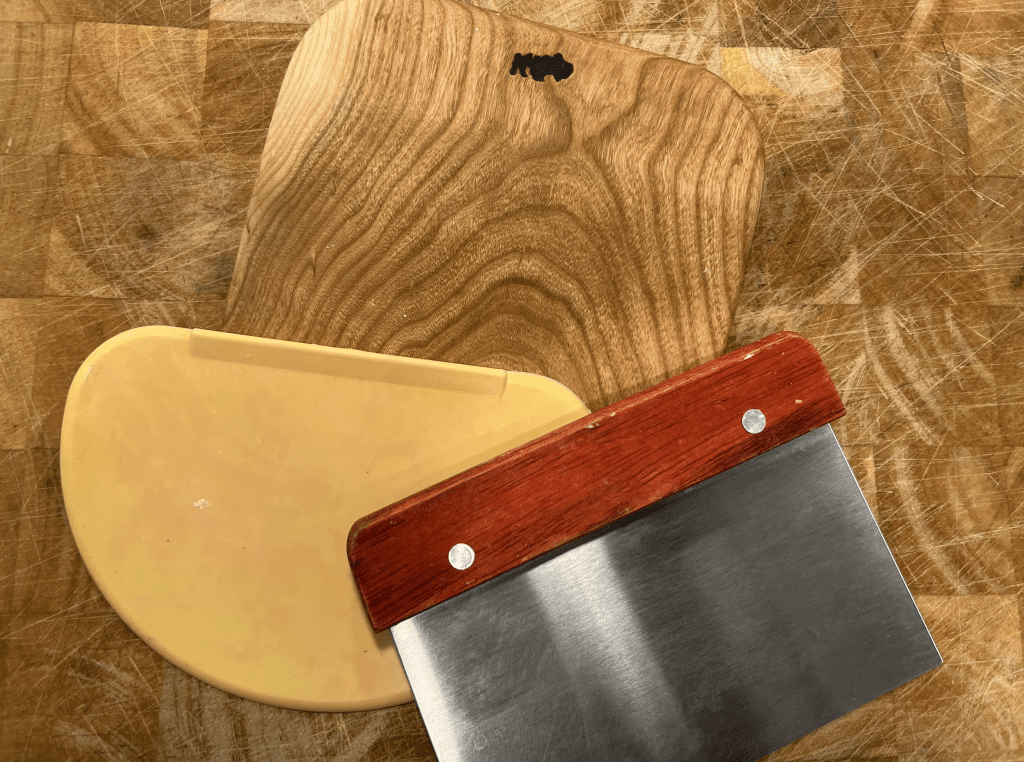A dough scraper, an essential tool in the arsenal of sourdough bakers, significantly influences the baking process. This versatile tool, available in plastic, wood, or metal, is key for efficiently handling sourdough. We’ll explore not only the differences between these materials but also delve into what a dough scraper is, how to use it, and why it’s a valuable addition to any kitchen.
What is a Dough Scraper?
A dough scraper, also known as a bench scraper or dough cutter, is a tool used in baking to manipulate dough and clean surfaces. It typically consists of a flat, rectangular blade with a handle. Its primary functions include cutting and dividing dough, scraping dough from surfaces, and aiding in transferring dough from one place to another.
How to Use a Dough Scraper
- Cutting Dough: Use the edge of the scraper to cut through dough, which is particularly useful for portioning or handling large batches of dough.
- Shaping and Folding: Utilize the scraper to fold dough, especially during the initial stages of kneading, or to shape it into desired forms.
- Cleaning Work Surfaces: After working with dough, use the scraper to easily clean flour and dough remnants off your work surface.
Why a Dough Scraper is a Good Kitchen Tool
- Versatility: Beyond handling dough, a scraper can be used for a variety of kitchen tasks like chopping vegetables or cleaning counters.
- Precision: It allows for more precise measurement and cutting of dough, ensuring consistency in baking.
- Efficiency: A dough scraper makes the process of handling dough quicker and more efficient, saving time and reducing mess.
Plastic Dough Scrapers
- Pros: Lightweight, flexible, and won’t scratch surfaces.
- Cons: Less durable and can retain odors and stains.
- Health Implications: Choose BPA-free and food-grade plastics.
- Cost and Utility: Affordable and versatile for basic baking needs.
Wood Dough Scrapers
- Pros: Aesthetically pleasing with a comfortable grip.
- Cons: Requires more maintenance and can warp.
- Health Implications: Needs regular cleaning and oiling.
- Cost and Utility: Mid-range cost, ideal for those valuing tradition.
Metal Dough Scrapers
- Pros: Durable, precise, and easy to clean.
- Cons: More expensive and can scratch surfaces.
- Health Implications: Opt for stainless steel for safety.
- Cost and Utility: Higher cost, suited for heavy-duty use.
Closing Thoughts
Selecting the right dough scraper comes down to personal preference, budget, and specific kitchen needs. While each material has its own set of advantages, they all serve the fundamental purpose of improving your baking experience. Whether it’s the practicality of plastic, the traditional charm of wood, or the precision of metal, your choice of dough scraper is a reflection of your baking style.
And remember, the perfect dough scraper complements your personalized needs.





















